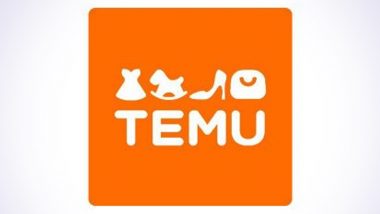Washington DC, November 29: The US Department of Homeland Security is looking into Chinese e-commerce platform Temu for potential breaches of the Uyghur Forced Labor Prevention Act, a move that could result in the company being banned from selling its products in the US, The New York Post has exclusively reported. According to officials and intelligence experts speaking to The NY Post, the incredibly low-priced company has an unfair impact on the US market, monitors its mobile app users, and depends on products produced through slave labour to maintain its rock-bottom prices, New York Post reported.
According to the report, a high-ranking DHS official confirmed to The NY Post that the agency is investigating Temu for potential slave-labour violations, but the Biden administration has not yet taken any action against the retailer. Temu was notably missing from a list of 29 Chinese companies added to the US banned list on Friday for violating the UFPLA. US-China Prisoner Swap: 3 American Prisoners Detained for 4 Years Released in Latest Prisoner Swap Between 2 Countries.
The UFLPA, which was drafted and pushed forward during the Trump administration and signed into law by President Biden in 2021, prohibits the import of goods that are "produced wholly or in part with forced labour" in China, particularly from Xinjiang, where Uyghur Muslims are detained in forced-labour camps. Companies found to violate this provision are added to the UFPLA entity list and are prohibited from selling any products in the United States. "[Customs and Border Protection]'s enforcement of this act is crucial to ensuring that goods entering the US are not the product of human suffering," the agency has said.
The report further stated that The law is one of the most forceful US responses to Beijing's "systemic use of forced labour against Uyghurs and other ethnic minorities in the Xinjiang Uyghur Autonomous Region," according to CBP. Temu, which launched in 2022, has rapidly flooded the US and European markets with a wide range of products, from clothing to keychains to furniture, all at a fraction of the usual cost. China Releases 3 Americans It Imprisoned for Years, Beijing Says US Returned 4 People to China.
On Monday, the website's top seller, a "luxurious faux rabbit fur throw blanket," was priced at just USD 12.05 less than a third of the price on Amazon. Kevin Hulbert, a former senior intelligence officer with the CIA's Directorate of Operations and CEO of XK Group Business Intelligence, told The Post that Temu's unusually low prices have raised concerns among officials for years.
"It's unbelievable that they can produce a dress, ship it halfway around the world, and sell it for just $8, which drives many US businesses out of the market," Hulbert said. "Then the question arises: how are they able to do this?"
"They do it probably by having cheap cotton in their goods and stuff, and so that's an issue. We shockingly allow Temu to self-certify that none of their cotton comes from the Xinjiang province, which is where slave labour's used."
As a new presidential administration approaches, some national security advocates are urging the US to revoke Temu's ability to "self-certify" that it complies with the UFLPA. Hulbert explained that advanced intelligence technologies exist to verify whether the company uses Xinjiang-sourced goods, such as by testing the origin of materials like fabric. However, it remains unclear if DHS has applied this method to Temu's products.
"You can forensically test cotton and see where it's from," he noted. "If you're wearing a cotton T-shirt right now, for example, I could take that cotton T-shirt off you, and I could test it forensically and tell you if that cotton was produced, grown and produced in Mississippi, Alabama, or if it was from Tajikistan, or if it was from China -- or if it was specifically from the Xinjiang province in China."
"So that capability's out there," he added.
In June 2023, the House Select Committee on the Chinese Communist Party urged the federal government to investigate Temu, citing a report that claimed the company's business model enables it to evade accountability under the UFPLA unless businesses can prove that the products were made without forced labour.
"American consumers should know that there is an extremely high risk that Temu's supply chains are contaminated with forced labour," the report said.
There are also cybersecurity concerns related to Temu's mobile app, echoing the issues that led Congress to ban the social media platform TikTok. TikTok was accused of spying on its users and granting Beijing access to their data.
A senior DHS official told The Post "There's no way I would download that to my phone." It's unclear whether those allegations are under investigation by the agency.
Last month, the European Union began an investigation into Temu, focusing on whether the company breached its Digital Services Act. The probe includes concerns over practices related to the sale of illegal products, the potentially addictive nature of the platform, the algorithms used to recommend purchases, and data access for researchers.
(The above story is verified and authored by ANI staff, ANI is South Asia's leading multimedia news agency with over 100 bureaus in India, South Asia and across the globe. ANI brings the latest news on Politics and Current Affairs in India & around the World, Sports, Health, Fitness, Entertainment, & News. The views appearing in the above post do not reflect the opinions of LatestLY)













 Quickly
Quickly


